|
|
|
Sort Order |
|
|
|
Items / Page
|
|
|
|
|
|
|
| Srl | Item |
| 1 |
ID:
124323
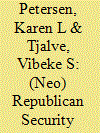

|
|
|
|
|
| Publication |
2013.
|
| Summary/Abstract |
Written from a vantage point in between Security Studies, Political Theory, and Governance Studies, this article attempts to theorize the current mobilization of civil society for the purposes of "national security," "risk precaution," or "homeland resilience" as the emergence of a neo-republican form of security governance-a mode of governance more reliant on organicist means of social construction than on economic or individualist instruments of social control. We argue that if the discipline of International Relations (IR) wishes to understand the nature of this emerging security order, it needs to assume a more cross-disciplinary approach and to develop a much richer idea of republicanism as not only a political philosophy but also a practice of governance.
|
|
|
|
|
|
|
|
|
|
|
|
|
|
|
|
| 2 |
ID:
105922
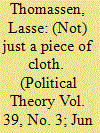

|
|
|
|
|
| Publication |
2011.
|
| Summary/Abstract |
To understand the politics of recognition, one must conceive of it as a politics of representation. Like representation, recognition proceeds at once in a constative and a performative mode, whereby they bring into being what is simultaneously represented or recognized. This structure has paradoxical implications. The politics of recognition is also a politics of representation in the sense that it always involves questions such as, Which representations are recognized? Whose representations are they? The reverse is also true: the politics of representation involves recognition because representatives and representations must be recognized in order to gain authority. In short, we can examine recognition as representation, and there is no recognition without representation, and vice versa. This is demonstrated through a reading of a recent British legal case, Begum, where the issue at stake concerned which representation of Islam should form the basis for the recognition of Islam in the school uniform policy.
|
|
|
|
|
|
|
|
|
|
|
|
|
|
|
|
| 3 |
ID:
089772
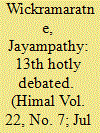

|
|
|
|
|
| Publication |
2009.
|
| Summary/Abstract |
The defeat of the LTTE as a military force has not made the ethnic question in Sri Lanka go away. If anything, the need for political solution has become ever more urgent. The euphoria over the military victory must allow the debate on power sharing and devolution to die. While these discussions take place, it is useful to go back to power-sharing arrangements already in place, and examine where they fall short.
|
|
|
|
|
|
|
|
|
|
|
|
|
|
|
|
| 4 |
ID:
133960
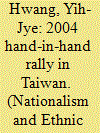

|
|
|
|
|
| Publication |
2014.
|
| Summary/Abstract |
This article investigates how a collective memory of trauma was produced in the course of commemorating the 2-28 Incident in the context of the 2004 election campaign, and how this memory production led to the parallel formation of a Taiwanese national identity. The 2-28 Hand-in-Hand Rally was designed to remember the 2-28 Incident as a historical trauma in order to be forgotten. The remembering of the 2-28 Incident must be regarded as a constructive process as opposed to a retrieval process. The memory of the 2-28 Incident was selectively constituted in favor of sovereign power.
|
|
|
|
|
|
|
|
|
|
|
|
|
|
|
|
| 5 |
ID:
129477
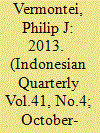

|
|
|
|
|
| Publication |
2013.
|
| Summary/Abstract |
The year 2013 has been seen as a prelude to the so-called political year of 2014. One of the weirdest political scenes in 2013 was when political parties had to advertise in the media in order to find people to
be listed as their candidates for the parliamentary election. Moreover, the parties had to rush in recruiting the candidates to meet deadlines for names submission set out by the Indonesian Election Commission KPU). This can be understood as a symptom of how dysfunctional our political parties are. Party recruitment and training program are indicators of whether or not a political party is well-functioning. A political party has to be ready with its recruitment process immediately after an election is done. It has to start all internal political process right away. By doing so, those who lost in the election will be able to quickly regroup while the winner consolidates. But what we saw in such an advertisement in the media simply reinforces the image
widely held by the public that politicians and /or political parties are just regular job seekers. Politicians are no longer thought of as noble individuals. Politics then become an arena which good people do not intend to enter.
|
|
|
|
|
|
|
|
|
|
|
|
|
|
|
|
| 6 |
ID:
132343
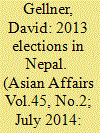

|
|
|
|
|
| Publication |
2014.
|
| Summary/Abstract |
In spite of all the difficulties, the November 2013 elections in Nepal passed off for the most part peacefully and with fewer irregularities than ever before in Nepal. The electoral system was the same as the system used in 2008, with a combination of First Past the Post and Proportional Representation. The results were a defeat for the Maoists, who went from being the biggest single party to the third biggest party. The victors were the two older established parties, the Nepali Congress and the Unified Marxist-Leninists, who seem to have benefitted from the voters dissatisfaction with the Maoists' showing in government. The second big losers in the election were the parties who favoured an ethnic-based solution to Nepal's problems, though the relationship between the Madheshis and the centre remains an unsolved problem.
|
|
|
|
|
|
|
|
|
|
|
|
|
|
|
|
| 7 |
ID:
112621
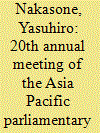

|
|
|
| 8 |
ID:
108358
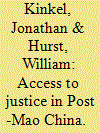

|
|
|
|
|
| Publication |
2011.
|
| Summary/Abstract |
Since the upheaval of the Cultural Revolution decade (1966-1976), post-Mao China has witnessed a sustained period of unprecedented legal reform. Criminal prosecutions and citizen lawsuits against the government, because they pit individual litigants against the authoritarian Chinese state, are two politically significant areas of law. We examine and critically assess the sociolegal scholarship on criminal and administrative legal reform as it has developed over the past few decades, with special attention to shifts in the conventional wisdom regarding legal reform and political liberalism in China and elsewhere. Additionally, we offer both theoretical and empirical suggestions for enhancing the explanatory power of sociolegal research in China.
|
|
|
|
|
|
|
|
|
|
|
|
|
|
|
|
| 9 |
ID:
108220


|
|
|
| 10 |
ID:
133755
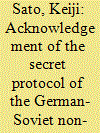

|
|
|
|
|
| Publication |
2014.
|
| Summary/Abstract |
In June 1989, the First Congress of People's Deputies of the Soviet Union established the Commission for Historical and Legal Estimation of the Soviet-German Non-aggression Pact of 1939. In the commission, representatives from Estonia, Latvia and Lithuania condemned the Soviet annexation of the Baltic States, prompting heated arguments regarding the invalidity of the related secret protocol of the pact with other members who continued to hold the traditional Soviet ideological view of the pact as something positive. The debate over the secret protocol had the further potential to extend to disputes over 'recovery of lost territory' amongst the Baltic States, Ukraine, Moldova, Belarus and Russia. This article analyses the arguments used by commission members, considering the interplay of national interests, how they balanced arguments between restoration of 'state sovereignty' and maintenance of borders, and how they finally compromised and concluded the commission's report.
|
|
|
|
|
|
|
|
|
|
|
|
|
|
|
|
| 11 |
ID:
131763
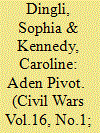

|
|
|
|
|
| Publication |
2014.
|
| Summary/Abstract |
This article argues that the Aden Insurgency was a pivotal moment in the history of British counter-insurgency. We argue that it was in Aden where the newfound strength of human rights discourse, embodied in Amnesty International, and of anti-colonial sentiment, expressed by the UN General Assembly, forced the British government to pay attention to public perceptions of colonial brutality. Using archival sources, we foreground three episodes in the history of the insurgency to support our argument and to illustrate that the changes witnessed were not the result of 'learning' but of a fundamental shift in the international environment.
|
|
|
|
|
|
|
|
|
|
|
|
|
|
|
|
| 12 |
ID:
124321
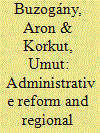

|
|
|
|
|
| Publication |
2013.
|
| Summary/Abstract |
Starting from the empirical observation of high levels of absorption of EU cohesion funds but strikingly low levels of substantive change in regional cohesion, this essay offers a contextual analysis of regional development policies in Hungary. Based on theoretical frameworks dealing with Europeanisation, new regionalism and participative development, it explores the reasons for this observation by analysing the role of administrative and planning structures and of development discourses. The essay shows that the Europeanisation of regional development policy triggered several changes in the planning process and led to the partial inclusion of new actors. However, the main effect of this was a growing centralisation of development policy making. The essay explains this by pointing to the domestic political context and the historical foundations of regional development discourses of the conservative and leftist liberal parties. While there are overlaps between the discourses on both sides of the ideological divide, they are perceived as incompatible by political actors. Thus, it is argued that considerations of political power, rather than ideological nature, shape Hungarian regional and development policy and explain the incremental reform process.
|
|
|
|
|
|
|
|
|
|
|
|
|
|
|
|
| 13 |
ID:
124482


|
|
|
|
|
| Publication |
2013.
|
| Summary/Abstract |
This article explores the political subjectivity of Kurdish children in urban Turkey. Often referred to as "stone-throwing children," since the early 2000s Kurdish children have entered Turkish public discourse as central political actors of the urban Kurdish movement. I suggest that the politicization of children can be understood in the context of transformations in age and kinship systems within the Kurdish community that were shaped by the forced migration of Kurds in the early 1990s. Focusing on the experiences of Kurdish children in the city of Adana, I argue that memories of violence transmitted by displaced parents, combined with the children's experiences of urban life, including exclusion, discrimination, poverty, and state violence, necessitate a reevaluation of how childhood is conceived and experienced within the Kurdish community. In a context where Kurdish adults often have trouble integrating into the urban context, their children frequently challenge conventional power relations within their families as well as within the Kurdish movement. In contrast to a dominant Turkish public discourse positing that these children are being abused by politicized adults, I contend that Kurdish children are active agents who subvert the agendas and norms of not only Turkish but also Kurdish politics. The article analyzes the ways Kurdish children are represented in the public discourse, how they narrate and make sense of their own politicization, and the relationship between the memory and the postmemory of violence in the context of their mobilization.
|
|
|
|
|
|
|
|
|
|
|
|
|
|
|
|
| 14 |
ID:
122758
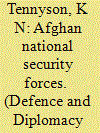

|
|
|
| 15 |
ID:
110108
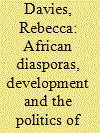

|
|
|
|
|
| Publication |
2012.
|
| Summary/Abstract |
This article seeks to add to the debate on the role of diasporas in development outcomes in sub-Saharan Africa by considering why diasporas are not apparently as effective as development agents in an African setting as they have proven thus far in other regions. It argues that changing diasporic engagement and activities on the continent should be examined against the backdrop of the emergence of a 'liberalisation from below' which emphasises local ownership of development outcomes, the historical variety of African state forms and the continuities in the exercise of power and the nature of these states. In so doing, it brings into focus the ongoing transformation in state-society relations whereby the dependence-of elites and ordinary citizens alike-on external resources continues to deepen, and the importance of this context in drawing any conclusions about the role of diasporas as agents of transformation.
|
|
|
|
|
|
|
|
|
|
|
|
|
|
|
|
| 16 |
ID:
128562
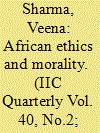

|
|
|
| 17 |
ID:
059042
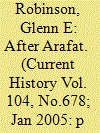

|
|
|
| 18 |
ID:
130866


|
|
|
|
|
| Publication |
2014.
|
| Summary/Abstract |
Curbing corruption is vital for China's future. But the exposure of corruption cases can only damage public confidence in the CCP and the state more generally. Corruption associated with toxic food, bogus medicines, grave abuses of power and criminal 'black societies' has produced a series of public scandals in China. Without reform, further occurrences could rapidly erode the legitimacy not just of the police and other judicial organs, but also of the ruling Chinese Communist Party (CCP). The recent trial of Bo Xilai, the former Chongqing party secretary and member of the party's elite 25-member Politburo, showcased the kind of corruption that China's past president Hu Jintao warned could lead to 'the collapse of the Party and the downfall of the state'. In 2011, the Bank of China inadvertently reported that between 1994-2008 as many as 18,000 corrupt officials had fled the country for destinations in Europe, America and other parts of Asia, plundering an estimated $120 billion from state-owned enterprises and other criminal activities. The costs of maintaining domestic public order have also grown rapidly, and, for the first time, domestic security outlays approved by the 2012 National People's Congress (NPC) exceeded defence, in part over concerns about the growth of mass protests, fraud, corruption and organised crime, and the need to strengthen weiwen (stability) and social harmony.
|
|
|
|
|
|
|
|
|
|
|
|
|
|
|
|
| 19 |
ID:
086664
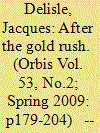

|
|
|
|
|
| Publication |
2009.
|
| Summary/Abstract |
Four months after the Beijing Olympics, on the vast plaza beside the games main venues, workers fought gusty winds and freezing temeratures to erect, incongruously, scores of artificial Chistmas trees while a handful of hawkers futilely pushed discounted memorabilia.
|
|
|
|
|
|
|
|
|
|
|
|
|
|
|
|
| 20 |
ID:
120112
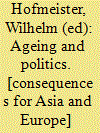

|
|
|
|
|
| Publication |
Singapore, KAS, 2010.
|
| Description |
247p.pbk
|
| Series |
Panorama Insights into Asian and European Affairs
|
| Standard Number |
01195204
|
|
|
|
|
|
|
|
|
|
|
|
Copies: C:1/I:0,R:0,Q:0
Circulation
| Accession# | Call# | Current Location | Status | Policy | Location |
| 057234 | 320/HOF 057234 | Main | On Shelf | General | |
|
|
|
|
|
|
|
|
|